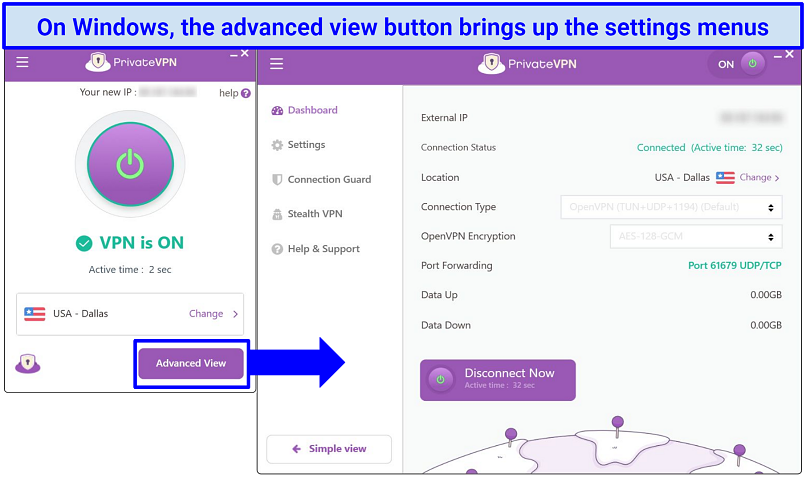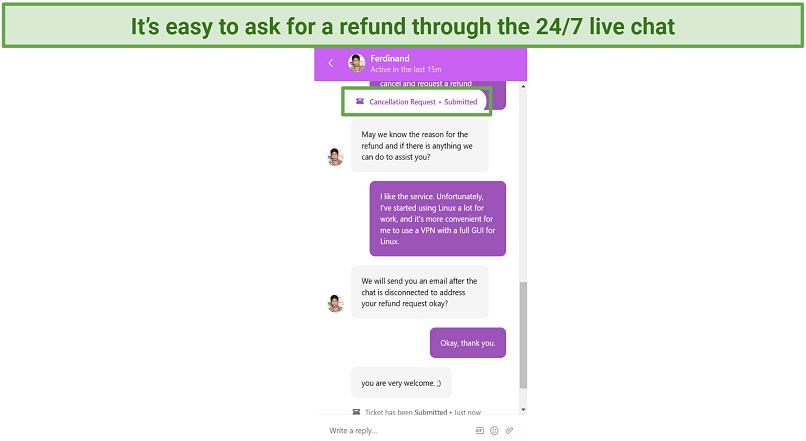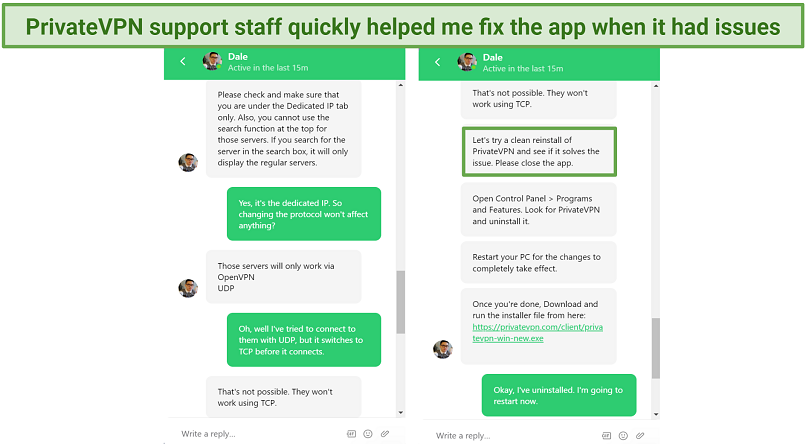PrivateVPN advertises itself as one of the best VPNs for streaming at a low price. It also claims to have great torrenting support, strong security features, and a true no-logs policy. But PrivateVPN is a small company, so can it compete with the biggest VPNs?
To learn the answer, I tested out everything it offers. My global team and I found out if it really lets you stream securely in the best quality. Extensive speed tests let me know if it can maintain fast browsing, gaming, and torrenting speeds. I also thoroughly researched its logging policy and checked for leaks to test its security.
After my tests, I strongly recommend PrivateVPN. There aren’t many VPNs that can encrypt your connection and still provide such smooth streaming experiences. Speaking of encryption, its security is excellent, and it never leaked my actual location. Plus, it has one of the best privacy policies and is supported by a 30-day money-back guarantee, so you can confidently try PrivateVPN. But it’s still a smaller company, which has a few drawbacks that mean it’s not for everybody.
Try PrivateVPN Risk-Free Today
Short on Time? Here Are My Key Findings
Pros
Cons
85% Off
Get 85% off your PrivateVPN plan today!
Money-Back Guarantee: 30 Days
And get 24 months completely free!
PrivateVPN Features — 2024 Update
9.6
|
💸
Price
|
2 USD/month
|
|
📆
Money Back Guarantee
|
30 Days |
|
📝
Does VPN keep logs?
|
No |
|
🖥
Number of servers
|
200+ |
|
💻
Number of devices per license
|
10 |
|
🛡
Kill switch
|
Yes |
|
🗺
Based in country
|
Sweden |
|
🛠
Support
|
Live Chat |
|
📥
Supports torrenting
|
Yes |
Streaming – Excellent Playback on All Major Platforms
9.8
PrivateVPN is one of the best VPNs for streaming. I worked with a global team to test it with all the top platforms, and it almost never altered our streaming experience in any way. My personal tests were done on a Windows laptop through browsers, but I had teammates who used mobile devices and streaming apps. There was only one minor issue where I had to reinstall the VPN.
While you could theoretically use PrivateVPN’s servers to access content outside of your region, you should know this will probably result in a copyright violation. We urge you to only watch the platforms available where you live. My team and I only used servers in our own countries to make sure PrivateVPN wouldn’t interfere with our streams.
Important! The vpnMentor team doesn’t condone any manner of copyright infringement. PrivateVPN has a strict no logging policy, so it won’t monitor your online activities. That means it’s up to you to use it responsibly. We advise you to uphold all of the terms of service agreements for any site, app, or service you utilize.
Works With: Netflix, Disney+, Hulu, Max, Amazon Prime Video, BBC iPlayer, and more
My global team and I were able to watch Netflix safely from 11 countries. PrivateVPN recommends using dedicated IPs, so that’s what I tested first. Since I’m located in the US, I connected to its dedicated Dallas server to see if I could watch Netflix in the same quality I’m used to.
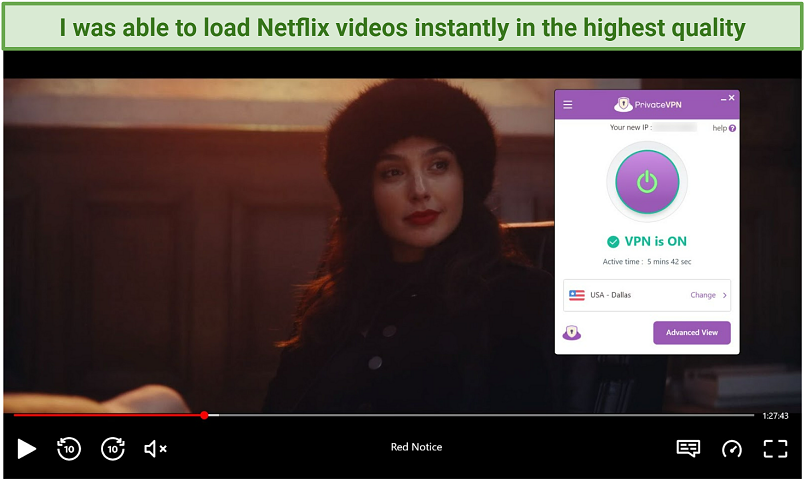 I didn't experience any buffering issues watching fast-paced movies with PrivateVPN
I didn't experience any buffering issues watching fast-paced movies with PrivateVPN
My team and I could watch Netflix from the following countries:
| United States |
Canada |
United Kingdom |
Australia |
| Spain |
Brazil |
Italy |
India |
| Finland |
Sweden |
Netherlands |
Norway |
Some of my colleagues could only watch Netflix Originals. This is a version of the site that only has content Netflix owns. This occurred for our testers in France, Japan, Switzerland, Poland, Germany, the Czech Republic, and New Zealand. This is pretty common, and I don’t see it as a huge negative.
On the other hand, we were able to watch Disney+ from the US, Canada, Italy, the UK, and Australia. I had the best luck using Firefox with the Los Angeles server. At first I tried using Chrome and Edge, but the site just loaded indefinitely. My teammate in Germany was also unable to watch the platform while connected.
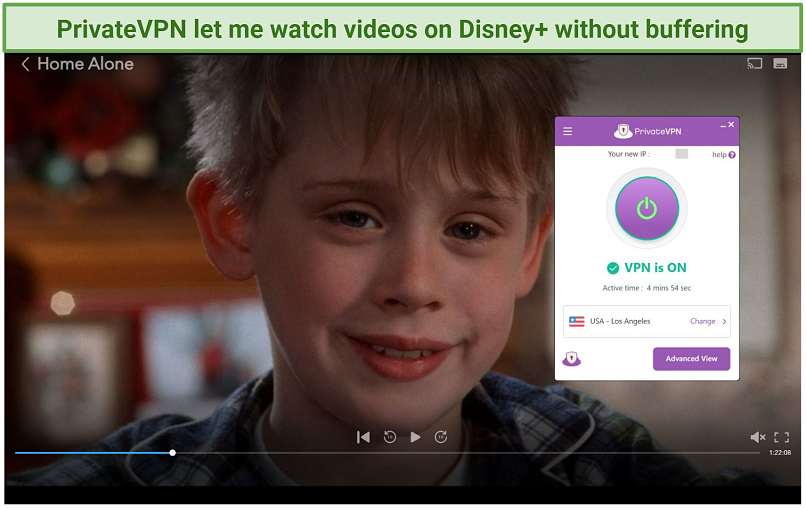 I never had to wait longer than 5 seconds to load videos in full HD
I never had to wait longer than 5 seconds to load videos in full HD
I could watch Hulu in the US with both dedicated servers available in the country. It was nice that I could use the Dallas server since it’s the closest one to me.
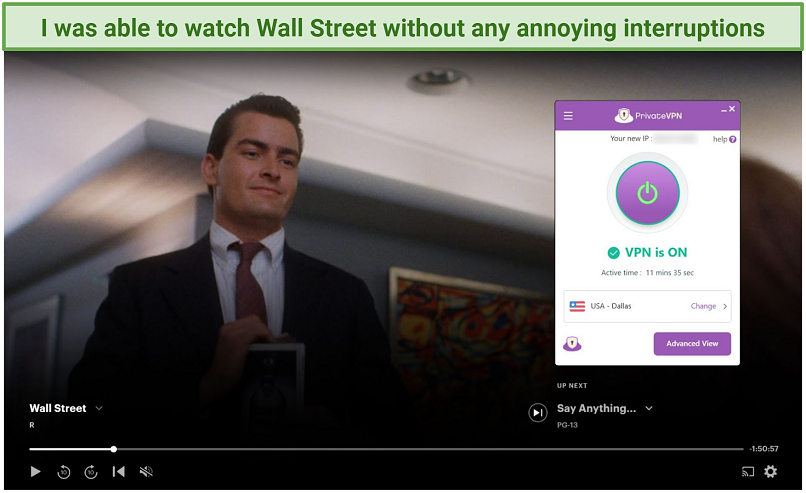 All my Hulu videos loaded after just a few seconds in full HD
All my Hulu videos loaded after just a few seconds in full HD
PrivateVPN support staff helped me watch Max with PrivateVPN connected. At first, I couldn’t even sign in even though I was positive my password and email address were correct. The live agent recommended I try reinstalling the VPN.
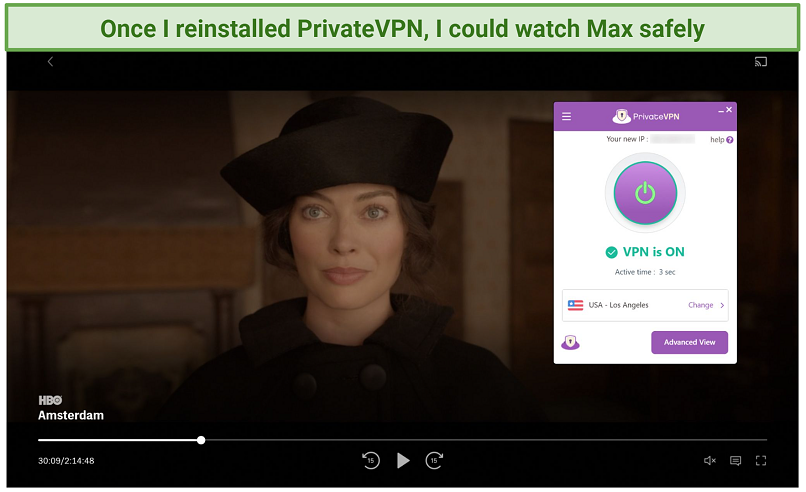 Dedicated IPs should connect via OpenVPN UDP — reinstall the app if it displays TCP
Dedicated IPs should connect via OpenVPN UDP — reinstall the app if it displays TCP
My global team and I could watch Amazon Prime Video safely with PrivateVPN. It worked during tests from 8 countries, including the US, the UK, Australia, France, Italy, Switzerland, Germany, and Japan. Only one person was unsuccessful during a test from Spain.
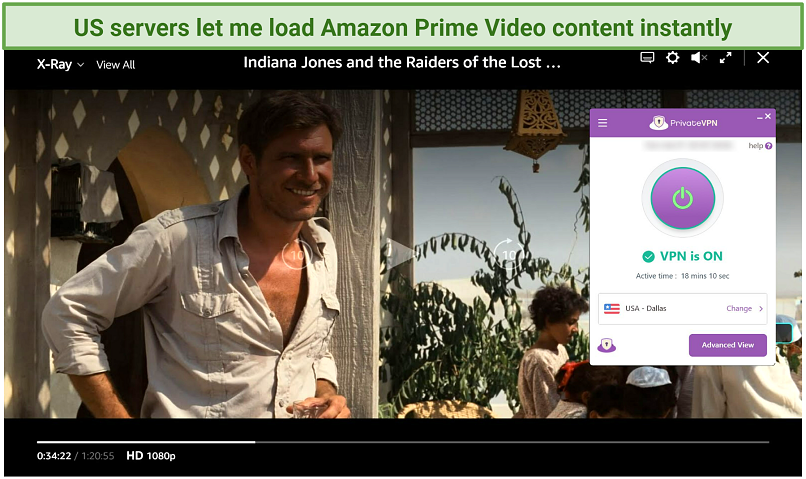 I was happy there wasn't any buffering even on regular servers
I was happy there wasn't any buffering even on regular servers
The last tests I performed from the US showed me PrivateVPN works great with ESPN+ and Peacock. My UK correspondents were also able to watch ITV Hub, Sky GO, and BBC iPlayer. Finally, my team member in Canada had no issues watching DAZN securely. Streaming public domain videos buffer-free on P2P streaming services like PopcornTime through Kodi was also easy.
Overall, PrivateVPN is one of the best VPNs for streaming. Compared to most of its competitors, there was hardly any troubleshooting, and the quality was uniformly excellent for my entire team.
Streaming copyrighted materials is illegal, and I don’t recommend it. Please make sure you only access copyright-free movies and shows on peer-to-peer streaming networks.
Speeds - Decent Overall With Some Dips
8.0
PrivateVPN isn’t superfast, but I’ve tested much slower VPNs. I performed all my tests on a Microsoft Surface Laptop running Windows 10. PrivateVPN runs on an HQN (high-quality network), which should make it faster. Unfortunately, there were times when it still slowed me down quite a bit.
These are the 3 categories I looked at during my speed tests:
- Download speed lets you know how quickly you can receive information. This is important for activities like torrenting and loading web pages.
- Upload speed is the opposite. It tells you how long it takes to send information. You need good rates to quickly upload videos on YouTube or make posts on social media.
- Ping is how long it takes your data to travel. This is essential for online gaming because it lets you know how quickly the network can respond to your inputs (or button presses).
PrivateVPN has several customization options, including encryption levels. I was surprised I got slightly better speeds with the higher 256-bit encryption, so I recommend sticking with that. You can also expect your speeds to be about 14% slower when you enable Stealth (making your VPN traffic appear like regular traffic).
So the following tests were done with 256-bit encryption with Stealth toggled off. Below you’ll see a chart that shows 5 speed test results from the Los Angeles server using each of the available protocol options.
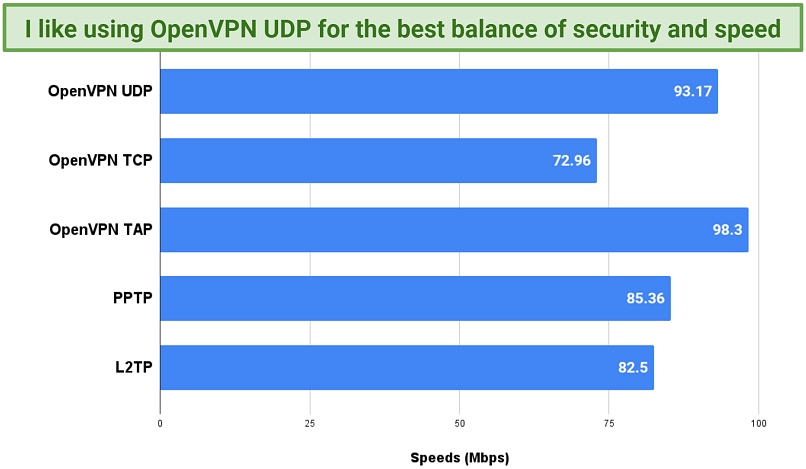 OpenVPN UDP is the default protocol and the only one that works with dedicated IPs
OpenVPN UDP is the default protocol and the only one that works with dedicated IPs
OpenVPN TAP was the fastest protocol in my tests, but the message “NOT RECOMMENDED” is displayed beside it in the app. I asked why on the live chat, and a support agent said: “...it would just be redundant to use it since the tap adapter is already a built-in component of the VPN app.”
They told me it shouldn’t be a security risk or cause any other problems. However, I decided to stick with OpenVPN UDP for the rest of my tests. It gave me the second-best speeds, and it’s the protocol you must use with dedicated IPs. So it’s the one I use the most often anyways.
I recorded tests on a variety of PrivateVPN’s servers as it’s a good snapshot of the VPN’s overall performance. My team and I don’t condone copyright infringement and recommend you don’t use any of PrivateVPN’s servers to access content unavailable where you live.
These are the results of my speed tests with dedicated IPs:
|
Distance |
Download |
Upload |
Ping |
| Base (Austin, TX) |
0 km |
302.38 Mbps |
231.04 Mbps |
4 ms |
| Los Angeles (US) |
2,215 km |
93.17 Mbps (69% drop) |
233.76 Mbps (1% increase) |
39 ms |
| Toronto (Canada) |
2,596 km |
85.02 Mbps (72% drop) |
250.95 Mbps (8% increase) |
45 ms |
| New York (US) |
2,802 km |
61.99 Mbps (80% drop) |
181.84 Mbps (21% drop) |
57 ms |
| London (UK) |
7,905 km |
141.23 Mbps (53% drop) |
283.54 Mbps (19% increase) |
113 ms |
| Sao Paulo (BR) |
8,090 km |
123.04 Mbps (59% drop) |
6.63 Mbps (97% drop) |
150 ms |
| Paris (FR) |
8,195 km |
56.95 Mbps (81% drop) |
127.35 Mbps (45% drop) |
121 ms |
| Zurich (CH) |
8,674 km |
61.65 Mbps (80% drop) |
172.04 Mbps (26% drop) |
138 ms |
| Tokyo (JP) |
10,537 km |
55.59 Mbps (82% drop) |
146.02 Mbps (37% drop) |
143 ms |
| Sydney (Aus) |
13,621 km |
108.71 Mbps (64% drop) |
263.42 Mbps (22% increase) |
191 ms |
| Mumbai (IN) |
14,428 km |
53.32 Mbps (82% drop) |
150.90 Mbps (35% drop) |
242 ms |
Even the nearby servers dropped my speeds significantly. The London server actually gave me the best download speed, even though it’s nearly 8,000 km away. My upload speeds were much better, with a few servers increasing it. The ping held up pretty well too. I was impressed that every server I tested in North America kept it below 100 ms.
My tests on regular servers gave me better results:
|
Distance |
Download |
Upload |
Ping |
| Dallas (US) |
313 km |
221.08 Mbps (27% drop) |
95.08 Mbps (59% decrease) |
11 ms |
| Chicago (US) |
1,803 km |
153.86 Mbps (49% drop) |
226.03 Mbps (2% drop) |
32 ms |
| Paris (FR) |
8,195 km |
133.52 Mbps (56% drop) |
219.52 Mbps (5% drop) |
121 ms |
| Tokyo (JP) |
10,537 km |
121.09 Mbps (60% drop) |
215.04 Mbps (7% drop) |
144 ms |
| Sydney (AUS) |
13,621 km |
114.66 Mbps (62 % drop) |
231.29 Mbps (0.001% increase) |
191 ms |
I wasn’t surprised that the closest server gave me the best speeds. It wasn’t the best result since I’ve tested some VPNs that only lower my speeds by 10% or less on nearby servers. However, I was glad that the regular servers were much faster at long distances. For example, the Paris server was almost twice as fast as the dedicated IP in the same city.
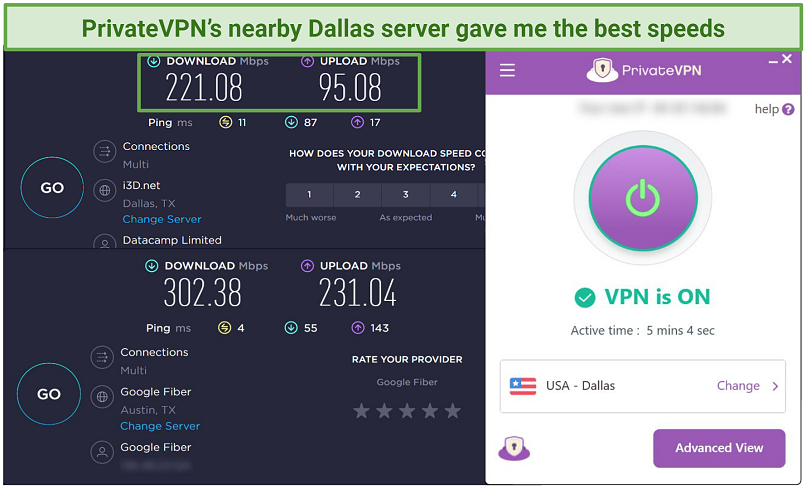 My connection speed only lowered by 27% connected to PrivateVPN’s Dallas server
My connection speed only lowered by 27% connected to PrivateVPN’s Dallas server
PrivateVPN doesn’t have the most extensive server network, so I’m guessing its speeds are slower than many of its competitors because of overcrowding. It also lets you have many simultaneous connections, which could make its servers even more crowded. I hope it enables you to see the server load in the future. For now, there’s no way to know how many people are on any of its servers. I’d also like it to add the Wireguard protocol for better speeds.
It’s also too bad that normal servers are faster than dedicated IPs. Dedicated IPs worked better for streaming, gaming, and torrenting in my tests. All these activities work best at fast speeds. But you should still be able to do all of these things at a comfortable speed unless you have a slow base connection. Overall, PrivateVPN is okay when it comes to speeds, but it definitely has room for improvement.
Are PrivateVPN’s Speeds Fast Enough for Gaming? Yes On Nearby Servers
9.6
I could play online games while connected to one of PrivateVPN’s dedicated IPs. In my first test, I tried the Dallas server. It’s the closest one to me, and it only had a ping of 10 ms. You want a ping rate between 50-85 ms for gaming, so your character can respond to your button presses close to instantly.
Even though the ping was low, the game was laggy with the regular server from Texas. After clicking my mouse, it took about half a second for the gun to fire. This meant I couldn’t enjoy the game, and I kept dying soon after respawning.
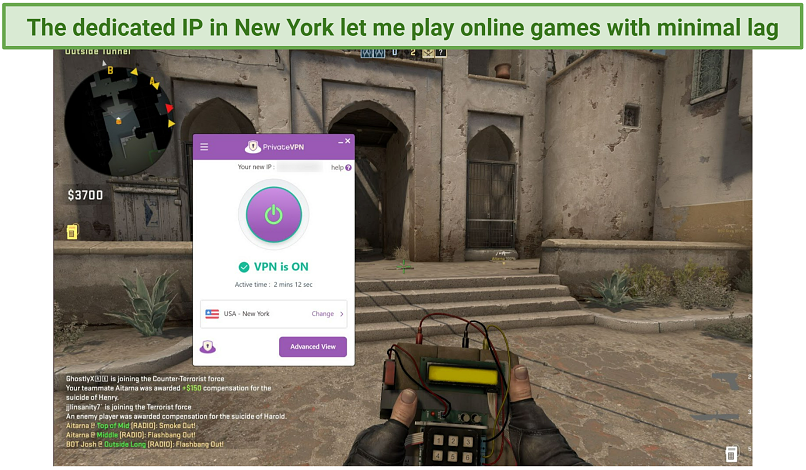 It only took 10 seconds to find a match
It only took 10 seconds to find a match
With the dedicated IP I tested, there was practically no lag. This was even though the ping rate was 4 times higher (around 42 ms). The gameplay paused briefly 1 time, but that can happen to me even without a VPN. I’m not great at the game, but I was able to plant a bomb to help my team win once the game was running smoothly.
I also tested a dedicated IP in the UK that’s about 7,905 km away from me. The ping was over 100 ms at that distance, and the gameplay was glitchy. I ended up falling through the floor and experiencing weird problems that made the game unplayable. However, that’s normal, and I was impressed with PrivateVPN’s gaming results overall. There aren’t many VPNs that let you play online games lag-free, even with a nearby server.
Server Network — Reliable Connections on a Limited Number of Servers
8.8
PrivateVPN has a small server network, but it gives you a nice mix of locations worldwide. The connections are reliable too. I only had a few issues when I used the L2TP protocol, which wouldn’t let me connect to Sao Paulo or Los Angeles. But it’s not a protocol I recommend since it’s slower and less secure than OpenVPN.
While there are only 200 servers in 63 countries, it has 7,000+ IPs in total. The IPs are rotated randomly when one is at full capacity. The table below gives you a breakdown of how many locations are available in each continent:
| Continent |
Number of Locations |
Countries |
| North America |
18 |
Canada (3 locations), Costa Rica, Mexico, Panama, and the US (12 locations) |
| South America |
8 |
Argentina, Brazil, Chile, Colombia, Costa Rica, Mexico, Panama, and Peru |
| Europe |
41 |
Austria, Belgium, Brussels, Bulgaria, Croatia, Cyprus, Czech Republic, Denmark, Estonia, Finland, France, Germany (2 locations), Greece, Hungary, Iceland, Ireland, Isle of Man, Italy, Latvia, Lithuania, Luxembourg, Malta, Moldova, Netherlands, Norway, Poland, Portugal, Romania, Russia (2 locations), Serbia, Slovakia, Spain, Sweden (2 locations), Switzerland, Turkey, the UK (2 locations), and Ukraine |
| Asia |
14 |
Hong Kong, India (2 locations), Indonesia, Japan, Malaysia, Philippines, Singapore, South Korea, Taiwan, Thailand, UAE, Israel, and Vietnam |
| Oceania |
5 |
Australia (4 locations), and New Zealand |
| Africa |
2 |
Nigeria and South Africa |
There are only 7 virtual servers. A virtual location means the server is in a different location than the IP it gives you. This shouldn’t cause any security issues, but it could give you worse speeds if it’s farther away than you expected. The virtual servers are Argentina, Chile, Colombia, Bangalore, Mexico City, Panama City, and Lima.
Most of PrivateVPN’s servers are rented. The vast majority of VPNs rent servers as it costs much more for them to own their infrastructure. As long as a VPN has a solid no-logs policy, this shouldn’t create any privacy issues. But it does give me added peace of mind when a VPN cuts out this middleman. I reached out through PrivateVPN’s live chat and found that it owns some of its servers.
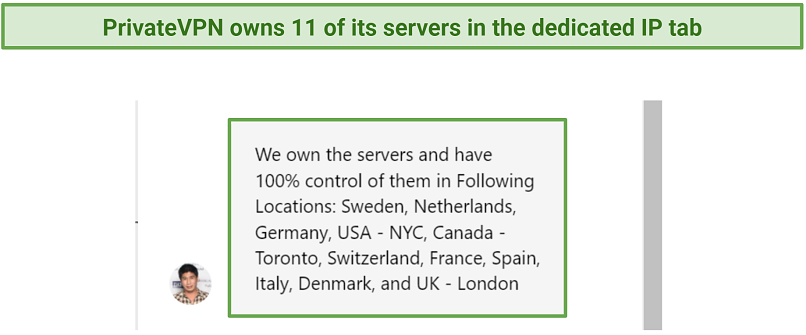 There are 15 dedicated IPs in total in 14 countries
There are 15 dedicated IPs in total in 14 countries
I do hope that PrivateVPN upgrades to RAM-based servers eventually. These servers delete all the information on them each time they reboot for added privacy. But I understand that PrivateVPN is a smaller service, so it can’t compete with the massive networks and advanced technology of its largest competitors. The number of locations should be enough for most people. But you can find VPNs with many more locations, especially in Africa, South America, or the Middle East.
Security — Secure but Missing Some Extra Features
9.2
PrivateVPN passed all of my leak tests thanks to its military-grade encryption. By default, it uses 128-bit GCM encryption. I recommend switching to 256-bit GCM since it’s harder to crack and it was faster in my tests. CBC encryption is also available, but GCM is considered to be a little safer. Plus, I didn’t notice any speed differences, so I’d stick with GCM. PrivateVPN also uses its own DNS servers, which cuts out a go-between, making it more secure.
It never revealed my actual location during tests with servers from the US, Australia, the UK, Sweden, and Japan. I did find one US server that gave me a different location than the one listed. IPv6 and DNS leak protection is automatically enabled, but WebRTC leak protection isn’t available. So, you’ll have to take care of that in your browser’s settings. It’s a little inconvenient, so I hope it’s added in the future.
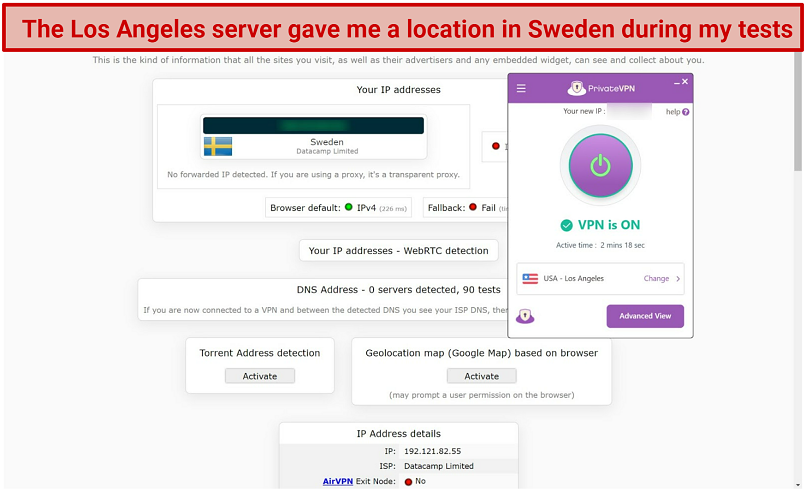 I was surprised, as the LA server isn't listed as a virtual location on PrivateVPN's website
I was surprised, as the LA server isn't listed as a virtual location on PrivateVPN's website
The kill switch works as advertised, but I wish it was available for more than just the Windows and Mac apps. I tested it by switching servers with a browser open. It blocked my connection every time, so I know it’s effective. This essential feature ensures your IP and data are never vulnerable, so I wouldn’t recommend using a VPN without one. Just make sure you turn it on since it’s not enabled by default.
Application guard lets you add apps to a list that are automatically disconnected when you turn off the VPN. It’s useful for things like a banking app that you wouldn’t want to leave on without protection. The last security feature it offers is Stealth VPN. This hides your VPN use, so you can use PrivateVPN on restricted networks. It utilizes the Shadowsocks proxy to do this. Support staff recommended you only use it if you’re in a country with heavy internet censorship.
There are also 5 protocols available:
- OpenVPN UDP is the best protocol for streaming. It’s also super secure since each version of OpenVPN is open-source. This means it's tested for vulnerabilities by people all around the world, which can then be fixed.
- OpenVPN TCP is a little slower than UDP and uses more data. It’s good to have as a backup, but UDP is the better choice for most activities.
- OpenVPN TAP isn’t recommended by PrivateVPN, so I don't know why it’s available. I asked support what use it has, but they couldn’t answer me.
- L2TP was the fastest protocol in my tests. However, it’s older and less secure than OpenVPN. Plus, I ran into connection issues with it, so I’d stick with OpenVPN.
- PPTP is even less secure than L2TP. Most people won’t need it, but some people use it with an outdated operating system.
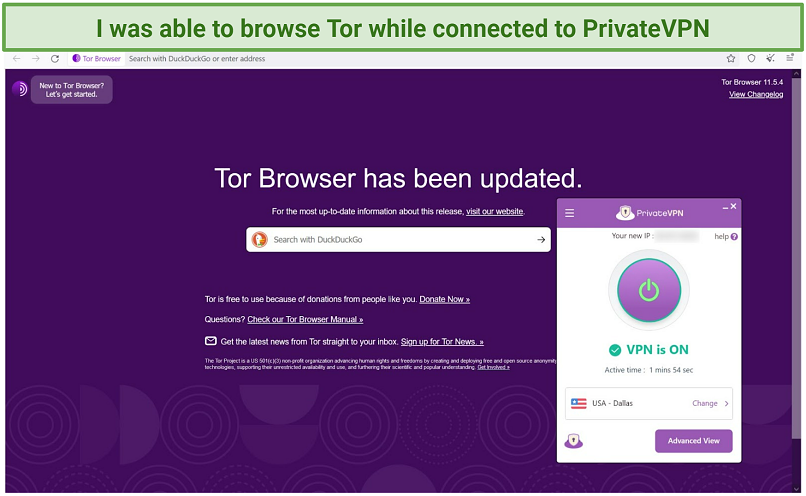 Tor is slow on its own, so you should be prepared for long load times
Tor is slow on its own, so you should be prepared for long load times
It’s unfortunate that PrivateVPN doesn’t have some extra security features many of its competitors have. For example, there’s no double VPN or WiFi protection. In addition, there’s no split tunneling, but you can connect to PrivateVPN’s SOCKS5 and HTTP proxy servers on your browser. That lets you change locations on your browser while the rest of your apps use your normal internet connection. But it’s not as convenient as split tunneling and doesn’t offer encryption.
Overall, PrivateVPN is secure. It always hid my true location and protected my vital information. It could be improved by adding some of its competitors' extra security features.
Privacy — Stores No Logs but It’s in a 14-Eyes Country
9.2
PrivateVPN is located in Sweden, but its great no-logging policy means that’s not an issue. Sweden is a part of the 14-Eyes Alliance. This is an agreement between governments to share information about their citizens. Plus, it’s not the most privacy-friendly country (there have been ongoing issues with its data retention laws). But PrivateVPN only stores the small amount of information you give them. So, they’ll have nothing to share if any government demands data on its customers.
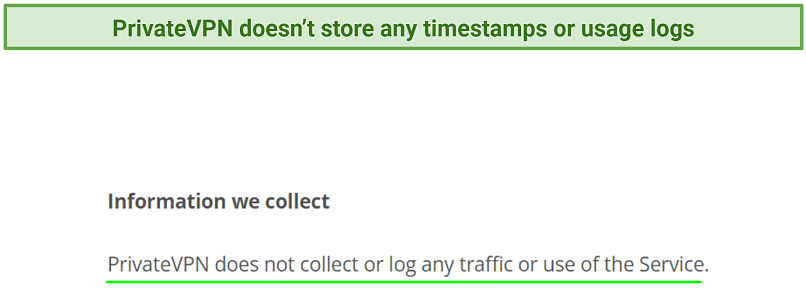 Most VPNs store some anonymized logs, so I'm impressed that PrivateVPN only keeps your email address
Most VPNs store some anonymized logs, so I'm impressed that PrivateVPN only keeps your email address
PrivateVPN only retains customer email addresses and passwords. Since payments are processed by external parties, PrivateVPN does not have access to any financial data. To maintain total anonymity, users can opt to create a new email address for signing up.
One issue is PrivateVPN’s policy hasn’t been verified by an independent audit or a public court case. Other VPNs pay reputable companies to perform audits on their policies, which prove that they’re followed. I understand that PrivateVPN is a smaller company, but I hope this is done in the future. A court case could also verify the policy, but the company can’t control that. On the other hand, PrivateVPN has a good reputation, and I trust them to be responsible with my data.
The text discusses the collaboration between an unnamed entity and a third-party entity, Intercom, which provides the live chat functionality. It suggests that while this doesn't pose a significant privacy concern, it is still recommended not to share sensitive information with any company's support staff. It further mentions that Intercom doesn't have the ability to view conversations through its chat service, as confirmed by PrivateVPN's support team.
Torrenting — Great Speeds on P2P Networks
9.8
PrivateVPN is a great choice for torrenting. Most VPNs drop my speeds a lot when I try torrenting. Without a VPN, I can usually reach a speed of around 12 MB/s during downloads. I’ve tested tons of VPNs that drop me down to about 1 MB/s or less. With PrivateVPN, I could reach 4 MB/s, letting me download a 1.6 GB file in less than 15 minutes. This was with a small number of seeders too.
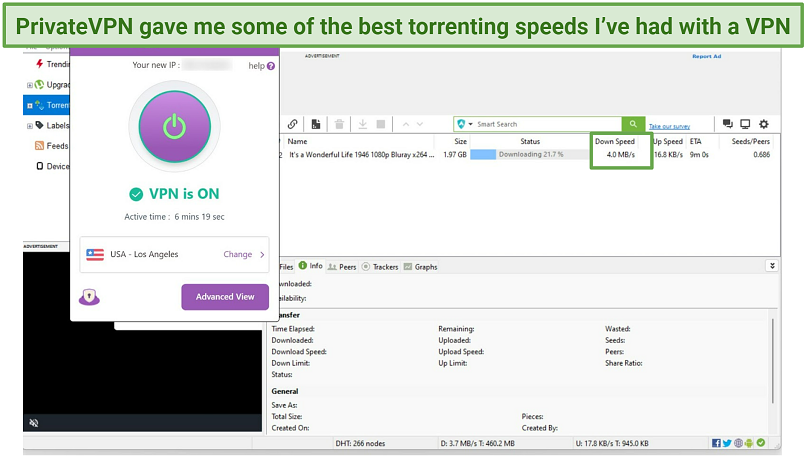 I found its dedicated IPs twice as fast as regular servers
I found its dedicated IPs twice as fast as regular servers
Every server of PrivateVPN has port forwarding activated by default, leading to quicker torrenting speeds. A support team representative conveyed that dedicated IPs provide access to "almost all" ports, in contrast to standard servers which grant access to just one. This might account for the notable speed disparity between dedicated IPs and standard servers.
Torrenting is legal in most parts of the world, but it’s illegal to download copyrighted files. My team and I don’t condone any illegal activities. Please read up on the rules and regulations where you live before you decide to torrent. If you want to stay safe on P2P networks, PrivateVPN is one of the best torrenting options.
Does PrivateVPN Work in China? Sometimes
Due to increased regulation of VPNs in China, PrivateVPN can’t guarantee it will work in the country. If you want to use it in China, it’s best to download the VPN before you enter the country. Once there, you should use one of the OpenVPN protocols and toggle on the Stealth feature.
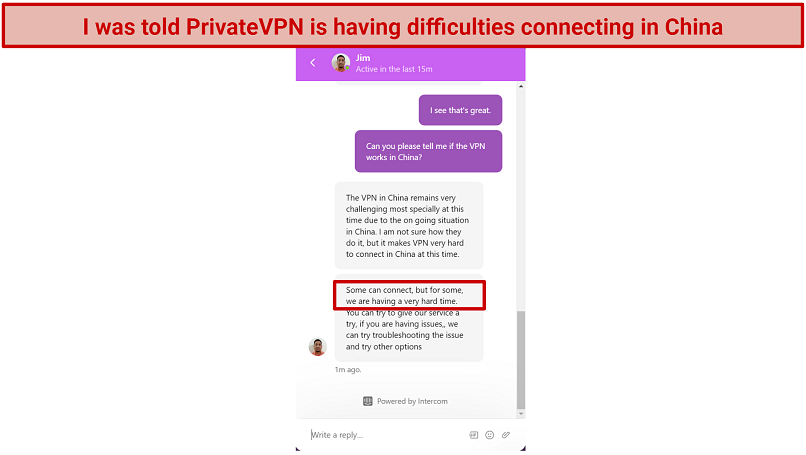 You'll get the best speeds if you use nearby servers in Hong Kong
You'll get the best speeds if you use nearby servers in Hong Kong
Generally, the Chinese government leans towards banning the technology itself rather than taking legal action against individuals using VPNs. However, neither my team nor I support any illegal actions. Always acquaint yourself with the laws of your current location before choosing to employ a VPN.















